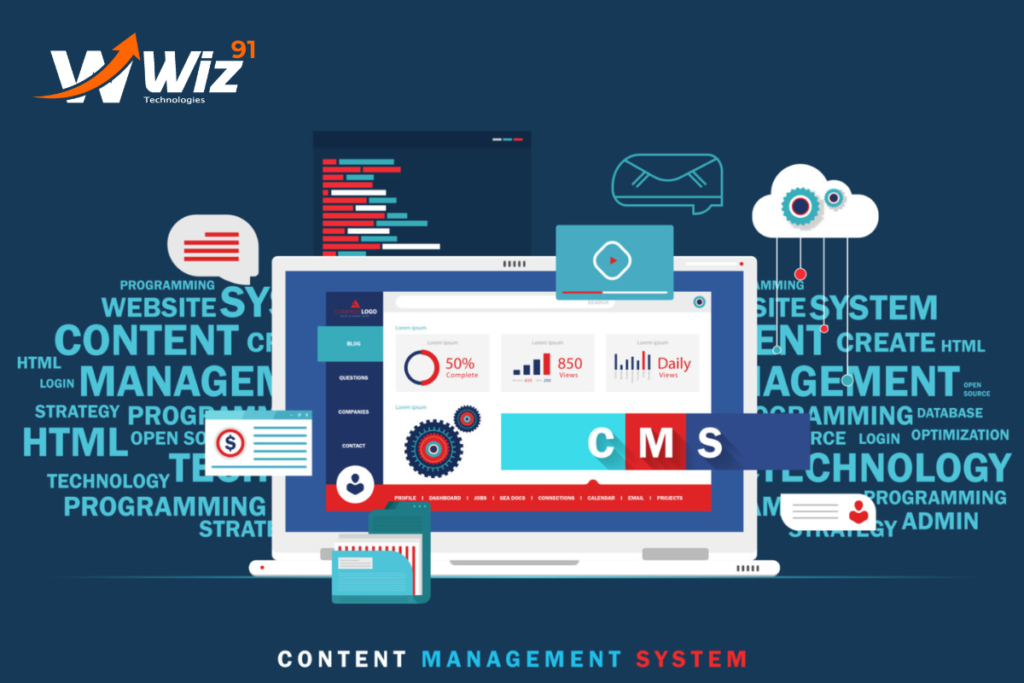In the digital era, we find ourselves in today, establishing a robust online presence has become imperative for both businesses and individuals alike. Whether you’re constructing a personal blog, launching an e-commerce platform, or creating a corporate website, one of the most pivotal decisions you’ll make is the choice of the Content Management System (CMS). A CMS serves as the backbone of your website, dictating how content is generated, organized, and presented to your audience. Given the vast array of CMS options available, making the right selection can seem overwhelming. This article aims to guide you through the process of selecting the most suitable CMS for your specific needs, empowering you to make an educated decision that aligns with your website’s objectives.
Unpacking the Basics of a Content Management System (CMS)
Before we delve into the selection process, it’s crucial to first understand what a CMS is and why it holds such significance for the success of your website. A Content Management System is a software platform designed to enable the creation, management, and organization of digital content without necessitating extensive coding or technical expertise. Content Management System (CMS) platforms offer user-friendly interfaces that facilitate the addition, modification, and publication of content in various formats such as text, images, videos, and more.
Here are some of the core benefits associated with using a CMS:
User-Friendly: CMS platforms are intentionally designed to be user-friendly, allowing individuals of all technical proficiency levels to create and manage web content effortlessly.
Efficient Content Management: A reliable CMS streamlines content management through features like version control, scheduling, and content categorization.
Customization: Many CMSs come equipped with themes and templates that can be customized to match your brand’s identity.
SEO-Friendly: Numerous CMSs offer built-in SEO tools and plugins, simplifying the process of optimizing your content for search engines.
Collaboration: CMSs support multiple users, enhancing teamwork by facilitating collaboration on content creation and management.
Now that we’ve established a foundational understanding of CMS and its advantages, let’s explore the steps involved in selecting the most suitable one for your website.
1. Define Your Website’s Purpose and Objectives
Prior to choosing a CMS, it is essential to have a clear understanding of your website’s purpose and objectives. Are you developing a blog, an online store, a portfolio website, or a corporate site? Defining your website’s primary function and long-term goals will assist in narrowing down the options available.
For instance, if your intention is to launch a blog, CMS platforms such as WordPress or Blogger may be highly appropriate. Conversely, if you’re venturing into e-commerce, platforms like Shopify or Magento could better cater to your requirements.
2. Assess Your Technical Proficiency
Your level of technical expertise should significantly influence your Content Management System selection. If you are well-versed in HTML, and CSS, and possess coding skills, you may opt for a more versatile CMS like Drupal or Joomla. On the other hand, if you’re a novice, user-friendly platforms like WordPress or Wix are superb choices.
3. Evaluate Content Types and Flexibility
Different CMSs are better suited for managing various types of content. Take into account the types of content you intend to publish, which may include text, images, videos, or interactive elements. Some CMSs excel in handling multimedia content, while others are more tailored to text-based content. Ensure that your chosen Content Management System can accommodate your specific content needs.
4. Consider Scalability and Growth Potential
Contemplate your website’s potential for growth. Will you be introducing additional features, expanding your content, or integrating third-party services in the future? It is crucial to select a Content Management System that can grow alongside your evolving needs. Platforms such as WordPress and Drupal are renowned for their scalability and extensive plugin libraries, which can aid in adding functionality as your website expands.
5. Budget and Financial Considerations
Budget is another pivotal factor in your Content Management System decision-making process. While many CMSs offer free versions, some may require payment for licenses or subscriptions, particularly if you require advanced features or e-commerce capabilities. Account for the costs of hosting, domain registration, and any supplementary plugins or themes you may require.
6. SEO and Mobile Responsiveness
Search engine optimization (SEO) and mobile responsiveness are pivotal for driving organic traffic and ensuring a positive user experience. Verify if the Content Management System you are considering provides built-in SEO tools and responsive templates. These attributes will simplify the task of optimizing your website for search engines and accommodating mobile devices.
7. Community and Support
The CMS community can serve as a valuable resource for resolving issues, locating plugins, and staying up-to-date with the latest developments. Platforms with active communities, such as WordPress and Joomla, often boast extensive documentation and forums that make it easier to find assistance when required.
8. Security and Updates
Website security is of paramount importance. Ascertain that your chosen Content Management System receives regular updates and possesses a strong track record in terms of security. Popular CMSs often maintain dedicated security teams that promptly address vulnerabilities.
9. User Reviews and Recommendations
Before arriving at a final decision, invest time in reading user reviews and seeking recommendations from peers or industry experts. Real-world experiences can offer valuable insights into the strengths and weaknesses of a CMS.
10. Test Before Commitment
Many CMSs provide opportunities for free trials or demos. Take advantage of these opportunities to explore the CMS’s interface and functionality. It’s crucial to feel at ease and confident in using the Content Management System (CMS) before making a commitment.
Conclusion
The selection of the appropriate CMS for your website stands as a pivotal decision that can profoundly influence your online presence and ultimate success. By precisely defining your website’s purpose, assessing your technical skills, evaluating content requisites, and considering factors like scalability, budget, SEO, and support, you can make an educated decision.
Bear in mind that there is no one-size-fits-all solution. The ideal Content Management System (CMS) for one website may not be the best fit for another. Invest adequate time, conduct thorough research, and prioritize the long-term goals of your website. With the correct CMS in place, you will be fully equipped to efficiently create, manage, and grow your online presence.





